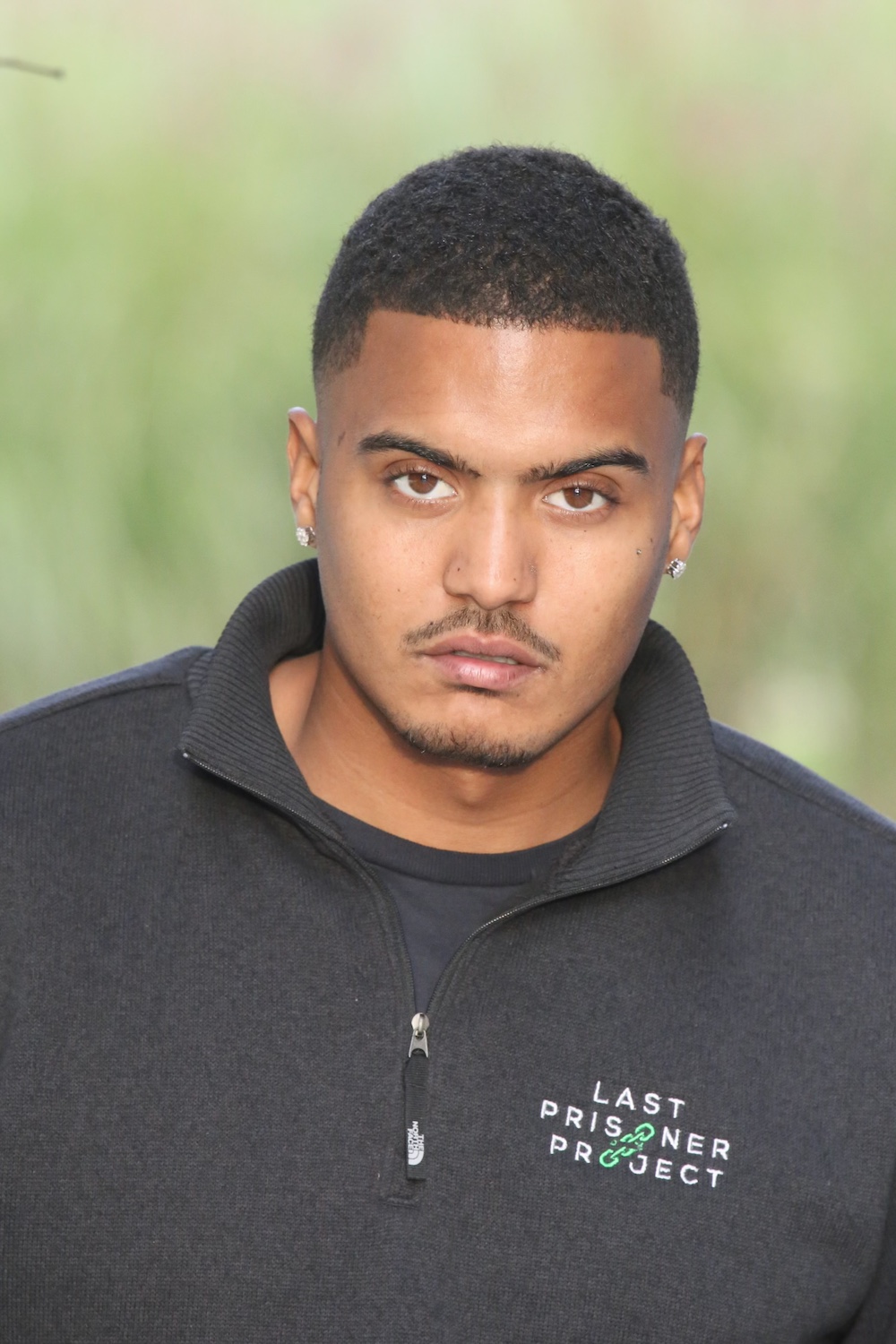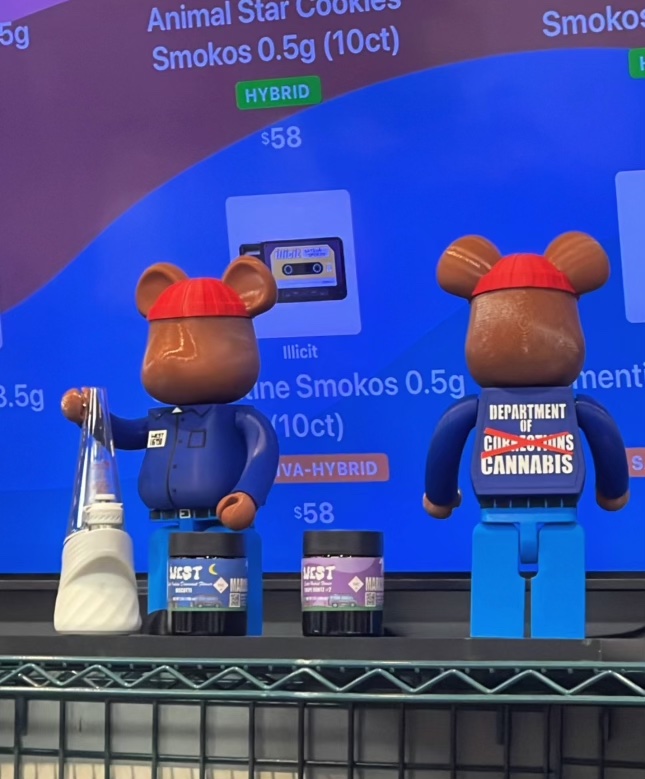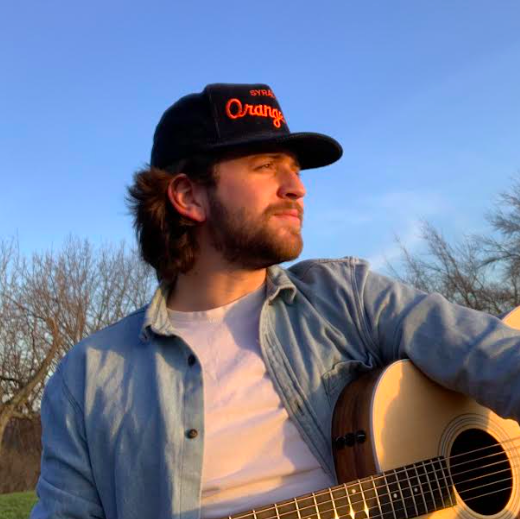
Donte West advocating for cannabis clemency and decriminalization with Last Prisoner Project in Washington D.C. (Image courtesy of the Last Prisoner Project)
In the first issue of Frederick Douglass’s groundbreaking newspaper, The North Star, the scholastic abolitionist declared that “the man who has suffered the wrong is the man to demand redress.”
Donte West is continuing Douglass’ legacy today, advocating for the release of prisoners incarcerated for cannabis-related charges. West earned recognition for sharing the story of his wrongful incarceration in 2017 for false felony cannabis charges. West, the full-time caregiver for his grandmother and younger brothers in California, was severed from his family after a road trip to visit a friend in Kansas led to local authorities falsely accusing him of trying to sell a pound of marijuana.
The Kansas Highway Patrol utilized its now-infamous “Kansas two-step” maneuver — a predatory approach that a federal judge has since declared unconstitutional — to pull West over for “dirt on his license plate.” The long-running tactic violated the Fourth Amendment rights of drivers, particularly those from outside of the state. Putting the cart before the horse, Kansas authorities detained first and asked questions later. Lacking reasonable suspicion for the initial stop, law enforcement extended the stop long enough to create reasonable suspicion to search the vehicle — a guilty until proven innocent mindset.
After the state of Kansas wrongfully charged West with possession and conspiracy to distribute marijuana, he was sentenced to eight years in Lansing Correctional Facility. The duration seemed excessive to West, even more so when he met violent offenders and murderers with shorter sentences.
When the public defender assigned to West’s case failed to help him challenge the charges, he took matters into his own hands. Haunted by the memory of his brothers crying when he left to fly to Kansas and report to sentencing, West began looking into his case and was shocked to see some glaring issues with the state’s only witness — details that his lawyer overlooked.
“Maybe if my lawyer would have read my case, maybe I wouldn’t be here right now,” West recalled thinking. “I began to read the discovery, I became obsessed with my case. I was … reading thousands of cases, kind of just soaking up the game. There was a lot of stuff I didn’t understand, but eventually, after two and a half years, it began to make sense.”
West filed a writ of habeas corpus which would allow him to appear in court and argue that the state had unconstitutionally incarcerated him. Writing to all 125 state representatives and 40 state senators in Kansas, he gathered support from elected officials while the prison staff helped him learn more about his case and the path to pursuing recourse. Local teachers and even the Kansas City mayor vocally supported West, who eventually achieved exoneration in 2021.

Continuing the fight
After securing his own freedom and returning to California, West didn’t sit idle. He has since dedicated his life to helping others in situations like the one he escaped. Now a spokesperson of the nonprofit the Last Prisoner Project, which fights criminal injustice related to the United States' "War on Drugs," West is focused on advocacy and is pursuing a law degree.
West works toward cannabis decriminalization and anti-incarceration with multiple brands, including doing community outreach for the Missouri-based cannabis company Illicit Gardens. The business doesn’t just distribute legal marijuana, but it also raises awareness about the plight of those still serving lengthy sentences for doing the same thing that other Americans are now building fortunes on, with the legal cannabis market now valued at over $21 billion in the U.S.
In 2023, Illicit Gardens launched the West Brand, raising awareness about the continued injustice of cannabis-related felonies for those now released from prison.
“People that were a felon couldn’t work in the cannabis industry in Missouri,” West said. “If all they knew to do was to sell weed, they wanted to get out and be in the industry and was like, ‘I’m gonna learn it the right way. I’m gonna pay taxes. I’m not gonna jeopardize my freedom.’ You couldn't even do it because you’re a felon.”
Through compelling graphic design on stickers, T-shirts and marijuana containers, West depicts the ongoing injustice of a nation in which some profit off the same thing others are punished for. One cannabis container displays a cartoon of a man on a cloud dangling a fishing rod above a prison. Then, it depicts a prisoner running across the cloud and jumping onto a bus for outbound prisoners.
“Get out, go get one, and go get another one out,” West said. “That’s kind of how the brand does it.”
His T-shirts depict a jail cell with a list of names on each side: On the left are the prisoners West helped to free, and on the right are the prisoners he is working to free. The men he's helped to free include his former bunkmate and current cannabis clemency advocate, Kyle Page, who was able to reunite with his daughter before her graduation thanks to West lobbying the parole board, and Robert Franklin, a Missouri prisoner who served 11 years of a nearly 20-year sentence for possessing a pound of marijuana.
Among the prisoners West is working to free is Kevin O’Brien Allen, who was serving a life sentence in Louisiana for the crime of selling $20 worth of marijuana. West and his coalition of advocates helped reduce Allen’s sentence to 35 years and are continuing to fight for his release.
West modestly describes the number of prisoners he is working to free as “only four or five” at a time, but each person represents a human with family and aspirations, a victim of a now defunct war on cannabis, a soul that may not have anyone else fighting for their release.
“If you don’t humanize these people, you instantly become a number,” West said. “Once you get into the justice system, you’re referred to as a number, and that’s it. How do we prevent that?”

Lobbying for cannabis clemency and decriminalization in Washington and beyond
West’s efforts are focused on states in the Midwest, but he performs a fair share of federal advocacy as well. Ahead of April 20, the unofficial marijuana holiday, West headed to Washington, D.C. with the Last Prisoner Project. The organization put together a massive bipartisan coalition to lobby for cannabis clemency and decriminalization.
The coalition declared April 18 a day of action to pressure the White House and Congress to fully legalize marijuana and grant justice to those currently and formerly incarcerated on cannabis charges.
Members of both parties from both ends of Congress joined the coalition and sought to convince other federal officials to put words into action and achieve cannabis justice once and for all.
While West appreciated the support from members of Congress, he reiterated that for the coalition to reach their shared goal, it is important to connect with and change the minds of those who disagree.
“We’ll never make a change if we’re not a conversation at the dinner table,” West said. “You want to be a conversation piece, because that is how you change the law. It’s a fantastic story with the right policy and legislation attack. It’s like, you gotta inspire me and then bring me the paperwork.”
To that end, West sees the potential of savvy brand marketing to influence change where elected officials have tried and failed.
On top of the marketing and advocacy he performs with Illicit Gardens, West has dipped his toe into modeling and was featured in the clothing company Lucky Brand’s new Last Prisoner Project support campaign. He joked that a judge who put someone away for 20 years on a cannabis charge might think differently when he sees Lucky Brand advocating for decriminalization because he probably owns a pair of the brand’s jeans.
“It shows you how cannabis is going mainstream,” West said. “Hopefully Nike does it next, or Louis Vuitton.”
Through advocacy big and small, West’s influence continues to grow. Kansas City, Missouri, recognized the activist last year by proclaiming April 20 “4/20 Donte West Cannabis Justice Day.”
West’s name now rings out across the Midwest as a tireless voice for the voiceless, be it his old bunkmate in Kansas or a Louisiana prisoner sentenced to life for possessing just two grams of marijuana. For victims of cannabis criminalization in prison and beyond, West is a rising north star.

Patrick is a freelance journalist who writes what the robots can't. Based in Syracuse, New York, Patrick seeks to uplift, inform, and inspire readers with stories centered on environmental activism, social justice, and arts and music. He enjoys collecting books and records, writing prose and poetry, and playing guitar.














